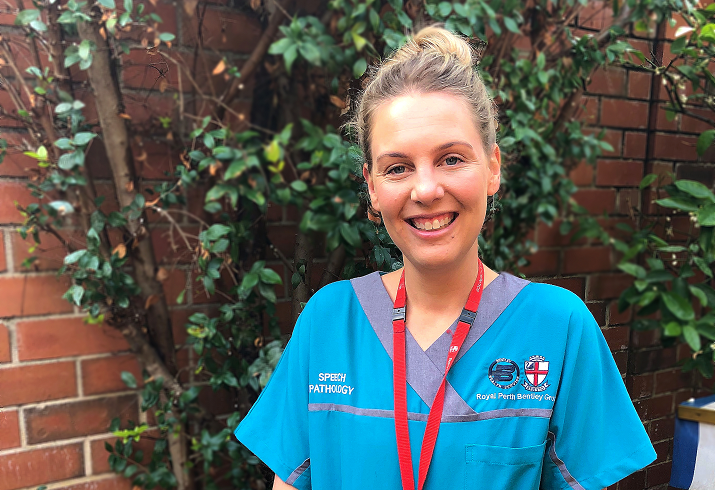Alison's patient journey through speech therapy

This Speech Pathology week we are working to raise awareness of the Speech Pathology profession, and the clinicians who work in the field. We spoke to Alison, one of our patients, whose 18 month journey through speech therapy with BHS Speech Pathologist Natasha (pictured) has changed her life. Here is Alison’s story, in her own words:
“Throughout my life, I have always loved singing, even as a small child. While I raised my four children, I was a private piano and guitar teacher and led the music at church and community functions. Once my children grew up and left home, I went to university and studied to become a classroom music teacher, which gave me the opportunity to sing all day with my students. I am also involved in the school choir program and concert bands, so my voice is incredibly important to me and my work.
In January of 2018 I had my thyroid removed due to cancer. The tumour had grown around my vocal nerve and it was a tricky surgery which could have left me with only a whisper. Thankfully, my skilled surgeon was able to remove the tumour successfully, but I was left with a raspy voice that tired easily and became hoarse quickly.
My voice impairment took the form of needing to use a lot of ‘air’ to make a sound. I couldn’t finish a sentence without ‘running out of air’ and needing to take a breath. This is a problem for a teacher who talks a lot. I couldn’t raise my voice or project my voice as I would quickly become hoarse and lose my voice. I had a complete empty ‘spot’ within my vocal range where I was unable to produce a sound. I could make a sound below and above the ‘spot’, just nothing within the ‘spot’. I was exhausted at the end of each day as I needed to strain so hard to use my voice.
I began to doubt how much longer I could do my job, and I was terrified I would have to give it up after working so hard as a mature graduate, simply because my voice could not do what was needed. It was also larger than that, I was struck by the fact that I was unable to sing. A day without singing is a day without sunshine. I was no longer able to lead the singing at church or community events such as the Community Carols in the Park.
My first appointment with the Speech Pathology team was wonderful because I felt finally like I was going to get some help. They all made me feel comfortable, and acknowledged my concerns. They assisted me to in having a scope put down through my nose to have a look at my vocal cords without the need for anaesthetic. I felt supported, encouraged and respected throughout a potentially scary and uncomfortable procedure, one that allowed my therapists to find the problem with my vocal chords.
At first, I thought there was no hope of fixing it as I knew it was related to my vocal nerve being damaged from the surgery. The therapists explained clearly to me what was happening and the mechanics of the vocal cord structure. They told me they could fix it and I would get better. Instantly, I was filled with hope and my spirits lifted. I was given breathing and vocal exercises to begin my journey to recovery.
After only a few exercises I tried my vocal scale and the ‘empty spot’ in my scale made a sound! I wanted to cry - I had my voice back! The next day I was singing ‘Eensy Weensy Spider’ with my pre-primary class, and for the first time since my operation I was able to make the full vocal scale as the spider ran up the spout. By the afternoon it had gone again but I knew how to get it back so I practised and practised.
I had been waiting a long time for this. I wrote the exercises on little cards so I could practice in the car as I drove to work. I began to finish sentences without needing to take a breath. I noticed the ‘tambour’ or ‘quality’ of my voice had changed and I was not so raspy. I was not as exhausted at the end of the day and seldom hoarse. My strain headaches had eased. I was improving every day.
I was called back to my next speech session after six weeks. This gave a deadline for my exercises, as well as a point to work towards. I found I had questions about technique and execution that I didn’t have quite right. We practiced until I got it right. I left the session feeling like I knew what I was doing.
Now, I know more about how the vocal mechanism works with its resonance and muscular connections with the neck and face. I understand about ‘head voice’ more and have even implemented it with my choir giving them a lovely sound. I understand about the fragile vocal folds and how I should not clear my throat or speak too loudly and strain them, and I’ve learnt how to breathe more effectively with my diaphragm.
Thank you Natasha, for working so closely with me and for helping me sing again.”

